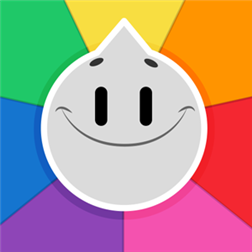
Last weekend, the other editors at The Poly Post told me about Trivia Crack, and it’s been downhill ever since.
Trivia Crack is a trivia game that you play against other people. You spin a virtual wheel, and depending on where you land, you get a random multiple-choice question about sports, history, geography, art, science or history. The questions are mostly user-based, meaning that you can submit trivia yourself that can become part of the game. For every three questions you get right (or if you land on the crown), you have a chance to win a badge in each category. Whoever gets all six badges first wins the game.
So far, I’ve creamed just about everyone I’ve played (multiple times): the other editors, my dad, my sister and other friends from school. And to be completely honest, I really (really) don’t try to win.
But after nearly a week of playing Trivia Crack, I’ve started to think more about what this game means culturally, and the pros/cons of playing it.
We think quizzing each other on random pieces of information is fun, but it also definitely means something to win this game.
Is it just me, or is it really amusing that this is the basis of a game that we play for pleasure or out of boredom? What does it really matter that I know which artist is known for wearing crazy outfits (Lady Gaga), where La Guardia airport is (New York) or what year France became a republic (1792)? Some of these questions are interesting in that we even consider them trivia. For example, one of the questions asked which United States president was accused of sexual misconduct with a staffer. Who decided that it was important that I know that, and why? And what does it matter to me or anyone else that I know the right answer to that question? Trivia Crack is truly a goldmine for social construct analysis.
According to the Trivia Crack subtext and the people who have made it or play it, knowing the right answer actually matters quite a bit. When you add the competition component to it, it becomes less of a brain exercise, and more of a “let’s see who’s the smartest” game. The game itself is harmless: you’re not playing for $1 million, and you’re not on national television. But bragging rights still mean something, and there’s something about it that makes you keep playing.
We actually know a lot more than we think we do.
I’ve answered 258 questions (and counting) correctly in this game, and the questions I get are all random. On several occasions, I have Googled questions or asked people in my general vicinity to help (sports and science). But for the most part, I’ve been able to answer them myself. I either know the answers from pop culture osmosis, or it’s been a lucky guess. It’s fascinating that we all acquire random bits of information, through just existing within a culture, that we can regurgitate when asked on a whim. It’s incredible that we just happen to know, and even when we get a question wrong, we all say to ourselves, “I knew that.”
Also, everyone I’ve talked to about this game says “I’m really good at this one category” and “I’m horrible at this other one.” And we all use other resources to answer the questions correctly: Google, other people or the in-game shortcuts. It’s a personal blow if you don’t get the question right, and embarrassing to miss one when you’re playing other people. The game, and just about every competition-based thing we do in life, is built on this concept.
It’s probably better for my brain than other game apps.
I have played many, many rounds of Candy Crush and spent many, many hours playing endless Bejeweled Blitz. At least Trivia Crack makes me dive into the recesses of my mind and recall random bits of information. When I play Candy Crush, I’m focused on getting rid of the jelly in the limited amount of moves. When I play Trivia Crack, I’m stretching my brain in a split second. That distinction proves to me that it’s having some kind of positive effect. It’s less video game-y than some of the other apps for smartphones, so I don’t feel like I’m completely wasting my time by playing it.
But it’s rotting my brain at the same time.
It really lives up to its name. When I see that I don’t have any turns to take, I grow impatient waiting for my partner. I still don’t know what about this game makes it so addicting.
I know that most of these games have a zenith of popularity (Words With Friends, anyone?), and I’ll be interested to see how and when it dies out. Until then, I guess I’ll be playing another game.
Do you play Trivia Crack? Tell me about it in the comments.
Leave a comment